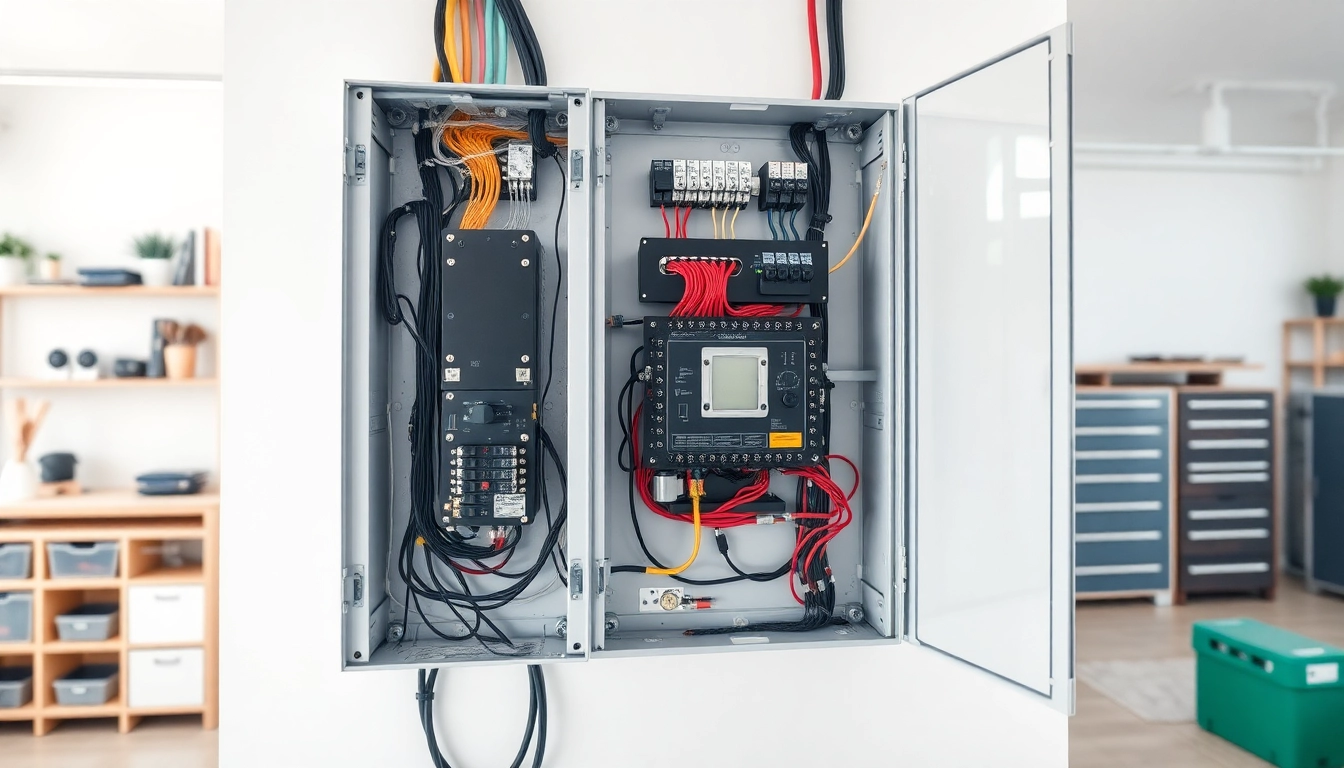The Electrical Panel plays an indispensable role in every modern home, serving as the pivotal hub for the distribution of electricity throughout your living space. Understanding its functionality, recognizing when it needs upgrading, and knowing how to choose and maintain it can enhance safety, efficiency, and the overall quality of your home’s electrical system. This article dives deep into the various aspects of electrical panels, including their vital role in your home, signs that indicate the necessity for an upgrade, methods for selecting the right panel, and essential tips for successful installation and maintenance.
The Role of the Electrical Panel in Your Home
What is an Electrical Panel?
At its core, an electrical panel—also known as a breaker box or service panel—manages the distribution of electricity from the utility provider to your home. It is a critical component that houses circuit breakers or fuses, which protect your home’s wiring by interrupting the electrical flow in the event of an overload or short circuit. These panels are designed to maintain the safety of a household by ensuring that electrical current is directed properly and safely to various circuits, including those used for lighting, appliances, and outlets.
How Electrical Panels Distribute Power
Electricity enters your home from the utility grid and is directed into the electrical panel. From there, it is distributed through multiple circuits, each protected by its own circuit breaker. This segmentation allows for dedicated power channels—reducing the risk of overload by limiting the amount of current that can flow through each circuit. For example, a kitchen circuit might be designed to handle higher loads due to appliances like microwaves and toasters, while a lighting circuit won’t require as much capacity.
Components of an Electrical Panel
The electrical panel consists of several critical components:
- Main Breaker: This device controls the electricity entering the panel and acts as a safety cutoff.
- Circuit Breakers: These automatically shut off power to circuits when an overload or short circuit occurs, preventing potential electrical fires.
- Bus Bars: Metal bars that conduct electricity within the panel, linking the main breaker to various circuit breakers.
- Neutral and Ground Bars: These components ensure that electrical faults are safely conducted away from appliances and out of your home’s wiring.
- Panel Cover: Protects the wiring and components from dust and accidental contact.
Signs You Need to Upgrade Your Electrical Panel
Age and Condition of Your Panel
The age of an electrical panel can significantly influence its performance and reliability. Older panels, especially those manufactured before the 1990s, may not be designed to handle today’s electrical demands. A panel that shows visible signs of wear, corrosion, or damage needs immediate attention. If your panel is more than 25 years old, it’s advisable to consult a licensed electrician to evaluate its condition and determine whether an upgrade is warranted.
Increased Power Demands in Your Home
As technology evolves, the number of electronic appliances and devices in our homes continues to soar. If you frequently overload your circuits—resulting in tripped breakers or blown fuses—it’s a clear indication that your current electrical panel may not support your home’s electrical load. With the increased use of power-hungry devices like smart TVs, gaming consoles, and energy-efficient appliances, upgrading to a panel with a higher amperage rating may be necessary to ensure seamless functionality.
Unusual Noises or Signs of Damage
Any unusual sounds, such as buzzing or popping, emanating from your electrical panel should be taken seriously. These noises often signify electrical issues that could lead to short circuits or fires. Additionally, any visual signs of damage such as burnt or melted components, scorch marks, or a smell of burning plastic should prompt an immediate assessment. Never attempt to diagnose electrical panel issues on your own; always seek professional assistance in such situations.
How to Choose the Right Electrical Panel for Your Needs
Understanding Electrical Loads
To choose the appropriate electrical panel, you must first understand your home’s electrical load. This includes cumulative usage from appliances, lighting, HVAC systems, and electronic devices. The total demand often determines the amperage rating necessary. Most homes require panels with ratings between 100 to 200 amps, but larger homes or those with extensive electrical usage may benefit from panels rated higher.
Panel Size and Configuration
When selecting a new electrical panel, size and layout play important roles. Panels vary in configurations, from simple single-phase systems to complex three-phase systems used in commercial settings. While a typical residential electrical panel will often suffice for homes, ensuring that it has enough space for future circuit expansion is critical. Choose a panel that allows for additional circuits as your needs grow, without the hassle of another upgrade.
Safety Ratings and Certifications
Electrical panels must meet strict safety standards. When purchasing, look for panels certified by recognized standards organizations, indicating that they have been rigorously tested for reliability and safety. Checking for local code compliance is essential to ensure that you are meeting regulatory requirements, which can differ by region.
Installation and Maintenance of Your Electrical Panel
Professional Installation versus DIY
While some homeowners may feel confident tackling minor electrical projects, the installation of an electrical panel is a complex task that requires professional expertise. Incorrect installation can result in dangerous electrical failures or even fire hazards. Always hire a licensed electrician when upgrading or replacing your electrical panel to ensure compliance with local code, safety standards, and best practices.
Routine Maintenance Tips
Maintaining your electrical panel ensures its longevity and optimal performance. Here are some essential tips:
- Regular Inspections: Schedule routine inspections with a qualified electrician to check for signs of wear, evaluate component functionality, and assess the overall condition of the panel.
- Keep It Clean: Dust can accumulate inside the panel, potentially causing overheating. Consider having the panel cleaned periodically by a professional.
- Label Circuits: Properly label each circuit in your panel to simplify troubleshooting and maintenance, allowing for quick identification in case of issues.
Ensuring Safety and Compliance
Staying compliant with all local electrical codes is of utmost importance. Ensure that all updates and inspections are documented, maintaining records of the types of work done and the components used. Familiarizing yourself with local safety standards can also help you to stay abreast of any changes in legislation that may affect your home.
Citations and Resources for Further Reading
Industry Standards and Best Practices
Electricity represents a powerful force, and mishandling it can lead to disasters. Referencing industry standards and best practices ensures that your electrical installations are not only compliant but are also performed with respect for safety. Websites from reputable electrical organizations provide excellent resources and guides.
Local Codes and Regulations
Every region has its own set of electrical codes that outline necessary standards for installations and repairs. Make sure to consult with local authorities or electrical contractors to ensure compliance when planning any electrical projects.
Recommended Educational Resources
Participating in workshops or home improvement courses focused on electrical systems can also enhance your understanding and provide additional insights into safely managing and upgrading your electrical panel.
Ultimately, understanding the critical role of the Electrical Panel in your home empowers you to make informed decisions that enhance safety, efficiency, and functionality. Whether you’re examining signs for an upgrade, selecting the right panel, or ensuring its longevity through maintenance, knowledge and professionalism are key. Engaging a licensed electrician for any significant electrical work is always advisable, ensuring that your home remains safe and compliant.


